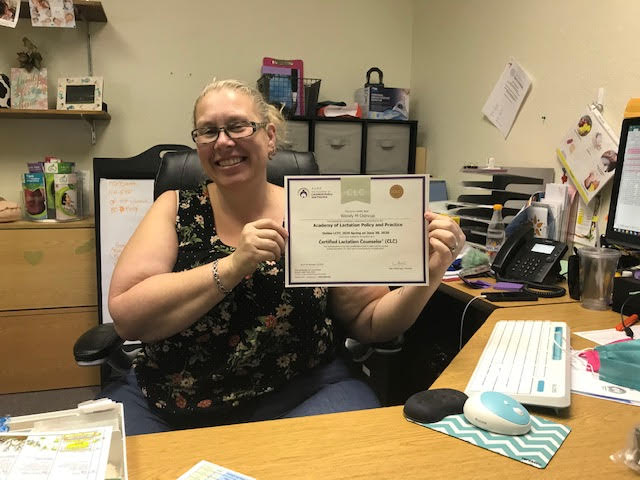HCCSO’s vision is to remove barriers to health. One of these ways we do this is by offering important trainings to key partners so they can offer support in their communities.
Supporting breastfeeding is a cornerstone of the Healthy Start program and a priority area of work for our Perinatal Task Force. This year, HCCSO was pleased to offer scholarship support to Healthy Start staff, Perinatal Task Force Partners, and key community leaders to pursue training to become Certified Lactation Counselors. This opportunity strengthens the systems of care that support families and increases access to high quality lactation education and support across our communities. Read more about our project, featured in Our Milky Way, a blog by the Healthy Children Project Center for Breastfeeding.
While families, communities and nations continue to suffer through the COVID-19 pandemic, good things occasionally glimmer amidst the devastation and tragedy. Early in the pandemic, we reported on the positive environmental impact of decreased transportation. In Fostering connection through technology, we touched on the creation of new technology to foster meaningful connection while we physically distance from other humans. We also learned that charitable human milk donations have increased dramatically during the pandemic.
Now, there’s more good news out of Oregon. A group of 24 maternal-child health advocates have completed the Lactation Counselor Training Course (LCTC) on scholarship made possible by Health Care Coalition of Southern Oregon (HCCSO).
The organization had initially intended to send a limited-sized group to the in-person LCTC in Springfield, Ore. which required travel costs, Community Partner Lee Ann Grogan, CLC reports.
But when the course became available online, they reassessed costs and realized they could support more scholarships.
“With the expansion, we have been able to support professionals from many different fields: pediatric providers, home visiting nurses, doulas, WIC staff, alcohol and drug counselors, homeless shelter staff, teen parent program staff, and all Healthy Start staff,” Grogan explains. “We are thrilled to support this network of professionals and know that having this level of knowledge and expertise in so many potential touch points will be a benefit to many families.”
Rachel, one course participant, offers praise, “This course was inspiring in and of itself. I really enjoyed the course material and how the information was shared. It was one of my favorite training experiences to date. I also wanted to complete that course because I could see how the information that I was learning could be used in my everyday job and I could pass the knowledge to my patients.”
Another participant, Kerri Anne, shares, “ The instructors are amazing and easy to follow… I am one who needs to see something multiple times before it really sinks in so having the ability to watch a module more than once before testing is extremely helpful. The quizzes after each module are also helpful. If I happen to misunderstand a question or get it wrong I love being able to see why my answer was incorrect.”
Course participants in the cohort are connected through a project management and team communication platform where they can build relationships with one another, share resources, and network with other lactation professionals.
Along with ongoing lactation education training opportunities, the cohort will be invited to participate in a Perinatal Task Force panel discussion about their training, Grogan adds.
She explains that the Perinatal Task Force is a collective impact group dedicated to overall community health, working together towards a shared goal, leveraging funds, and aligning priorities to be most effective.
“I would encourage other organizations interested in supporting wide-spread lactation education to do some dreaming and problem-solving with any organization that works with families,” Grogan advises. “We did not anticipate the interest from so many different fields of infant and family services, but are very pleased with the results! Our organization was able to provide financial support to our partner organizations for this opportunity, but we know that our partnerships are stronger and the investment will help ensure that the voices of lactation professionals are heard across our region. That will have a lasting impact when we look to future training needs, advocacy opportunities, and events.”
While the circumstances brought forth by the pandemic have broadened some opportunities, a shift to remote support models for families has proven challenging.
Southern Oregon is burdened by higher maternal-infant mortality rates than the rest of the state.
Grogan points out key areas of health challenges:
- “Food Insecurity– Over 15 percent of all residents in Douglas and Josephine Counties are food insecure, but this rate is higher for children with one in four children in our region being food insecure.
- Unemployment– Our area’s unemployment rate continues to regularly exceed the state rate.
- Poverty Status– Both Douglas and Josephine counties have higher poverty rates than Oregon and the U.S. Over one in four children in the region live in poverty.
- Maternal Smoking– Our region has alarmingly high rates of maternal tobacco use, with over 20 percent of women smoking during pregnancy.”
She goes on to explain, “Our rural communities lack access to reliable internet and cellphone services… The majority of our clients experience the crisis of poverty and do not have the financial means for smartphones, tablets, or computers. Beyond access to the required technology, tech literacy is generally low for our population.”
Because of these limitations, Grogan says most of their services are provided over the phone.
Catrina, a cohort member, says that even telephone communication can be difficult because of poor reception in rural areas. Without being able to observe a feeding, she says she and her colleagues have had to tap into their listening skills.
“We’ve been using our knowledge gained from our CLC training and listening to what our parents are telling us to help them solve the challenges they have faced,” she says.
For those with internet access, HCCSO transitioned their most recent Community Baby Shower to social media. Lactation care providers addressed the importance of early literacy and gave out hundreds of books, addressed safe sleep education and gave away more than 50 cribettes and breastfeeding supplies like breast pads, easy-to-read breastfeeding guidebooks, and hand pumps.
“We reached hundreds more families with our social media outreach than we had planned to with our in-person event, so that is definitely a silver lining!” Grogan exclaims.
Kerri Anne and other LCTC participants in the cohort share that COVID-19 has presented the opportunity to change their perspective, embrace frequent change, and exercise flexibility.
“Covid also accelerated our services and encouraged us to change what we do and how we offer assistance to meet the needs of our patients and their support systems and care teams,” Kerri Anne explains. “… We want them to feel supported and remind them that social distancing shouldn’t mean isolation. We want our families to lean on us … during these uncertain times. Covid has brought us closer to the families we work with and we now check in with them weekly just to see how they are doing rather than wait for them to contact us with a need or concern.”
Copied with permission from Healthy Children Project Center for Breastfeeding’s blog–Our Milky Way.

